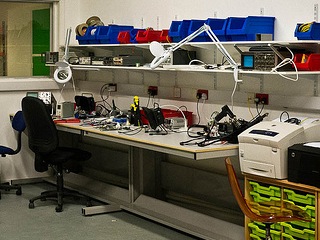Equipment/Electronics Workbenches
From Makespace
Equipment / Electronics Workbenches
Workbenches for electronics and precision work.
Benches
- 2x 1800mm x 900mm ESD cantilever benches http://www.bigdug.co.uk/workshop-benches-c348/antistatic-workbenches-c721/antistatic-workbenches-capacity-300kgs-pp4582
Equipment
- Bench power supplies (e.g. a mix of 5V, 12V, variable, and multi-rail PSUs)
- PCB holders or "helping hands"
- Magnifying lamps
- Side cutters
- Multimeters
- Oscilloscopes
- Signal generator
- Wire
- Selection of basic components (res, caps, v-reg, basic digital logic, basic IC's - 555,358, connectors, cable)
Requirements Notes
Wishlist
- Abrasive pen
- Heatsink tweezers
- Logic Analyser
- spectrum analyser
- ESD handling equipment, eg. anti-static mats, wrist-strap, earth points, tester
- USB microscope with monitor?
Bench Requirements (based on conversations with lots of people!)
- Height: Standard workstation/stool height (~840mm) rather than desk/chair height - allows working standing or sitting on stools
- Depth: Standard electronics workstation depth of ~900mm to allow for equipment at the back whilst still giving decent workspace
- ESD - whilst some people don't care, other seem to care a lot, so assume antistatic worksurface
- Structure - A long workbench surface along the wall of the main workshop, approximately 4m; Options:
- Standard electronics workbenches (metal structure bench with drawers below left/right, back power strip at back, raised shelf)
- Basic electronics workbences without storage below, cantilever or 4-post design
- Worksurface (e.g. kitchen) fixed to wall with some drawer units as stands (e.g. ikea)
- Other considerations:
- Allow for a variable number of people to sit at it (i.e. bucnh up, couple of people around same project)
- Decent storage for all the basic tools, components
- Some form of raised area for scopes/test equipment
- Very sturdy - i.e. wont move if lent on, pushed against etc

